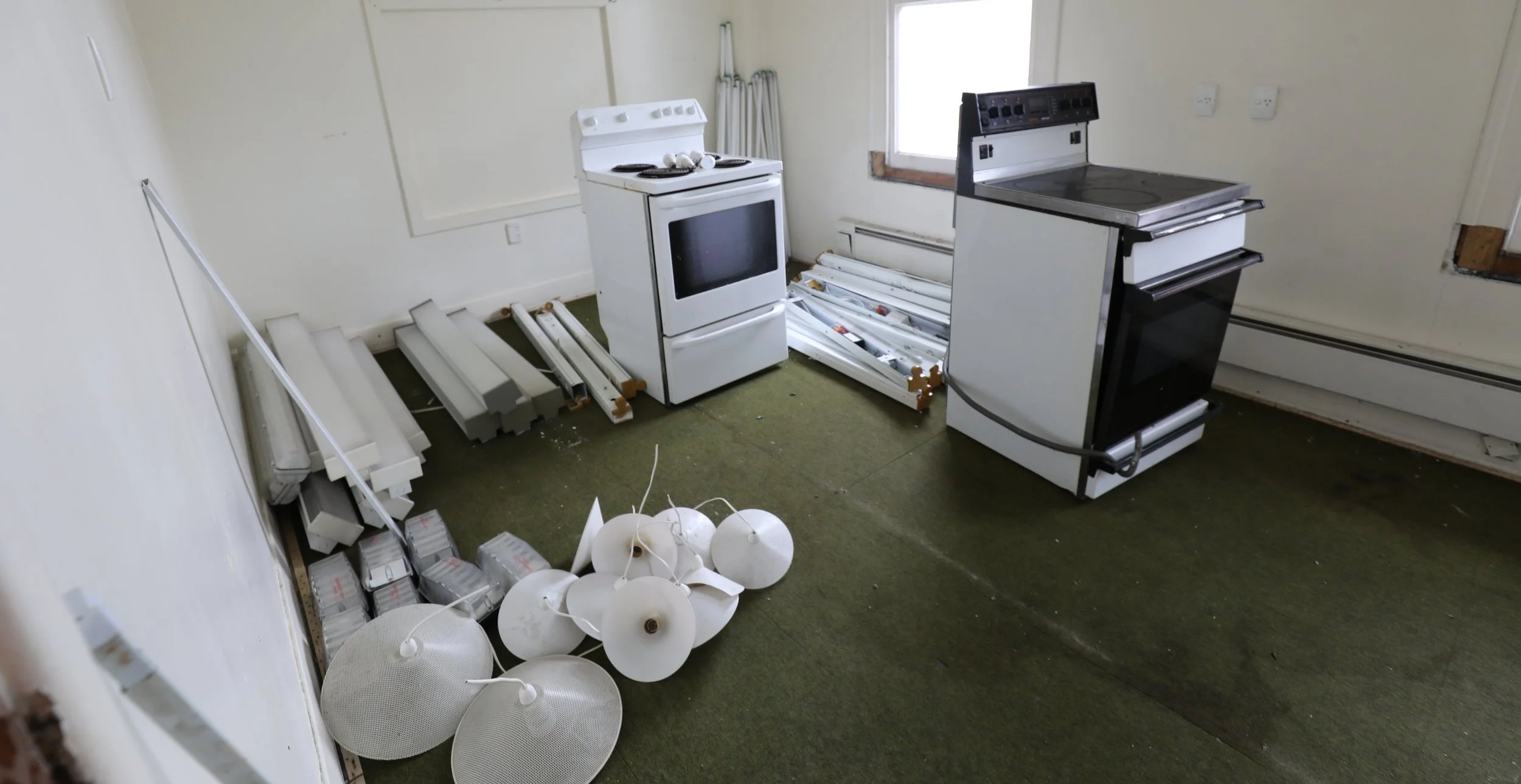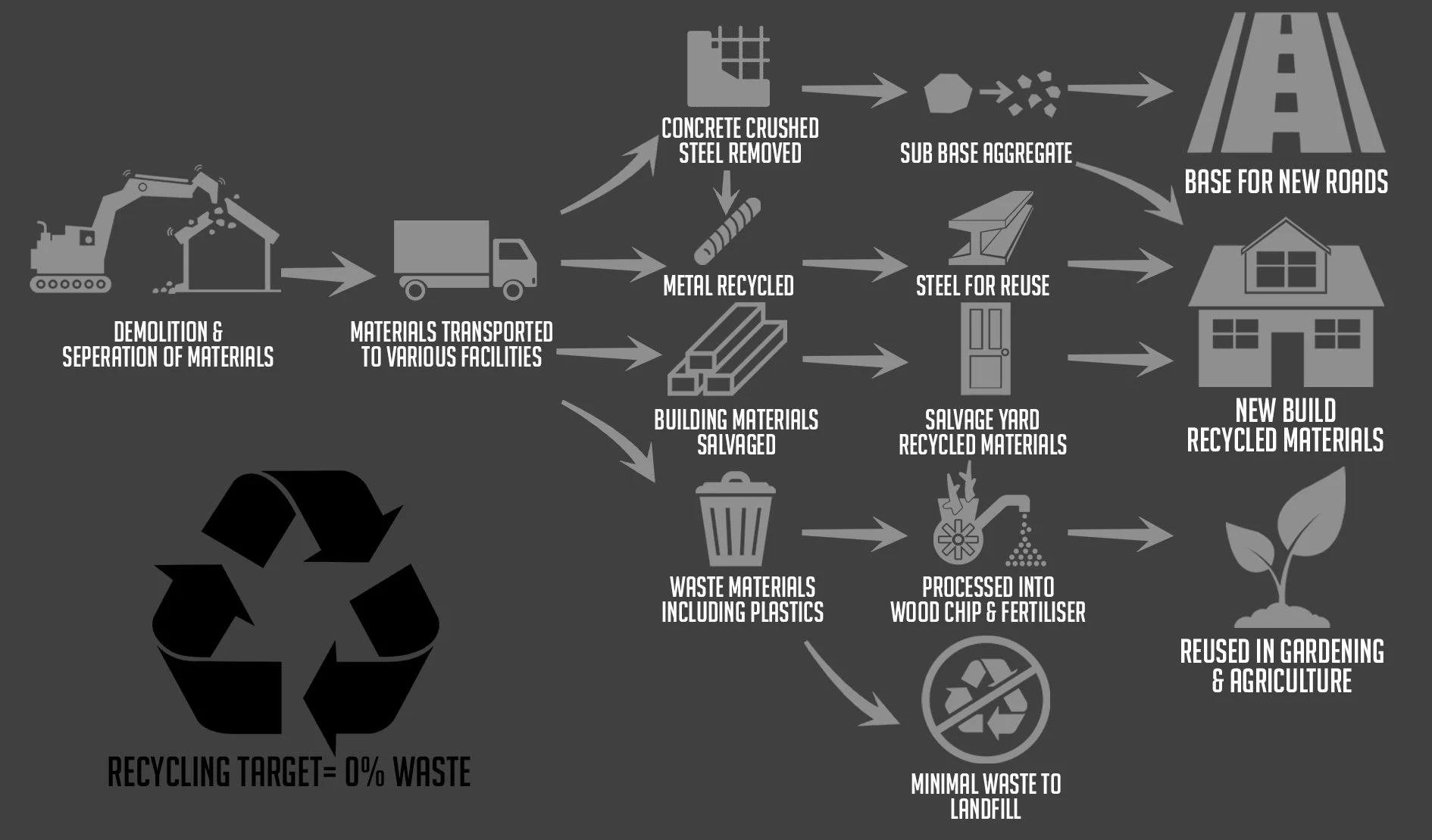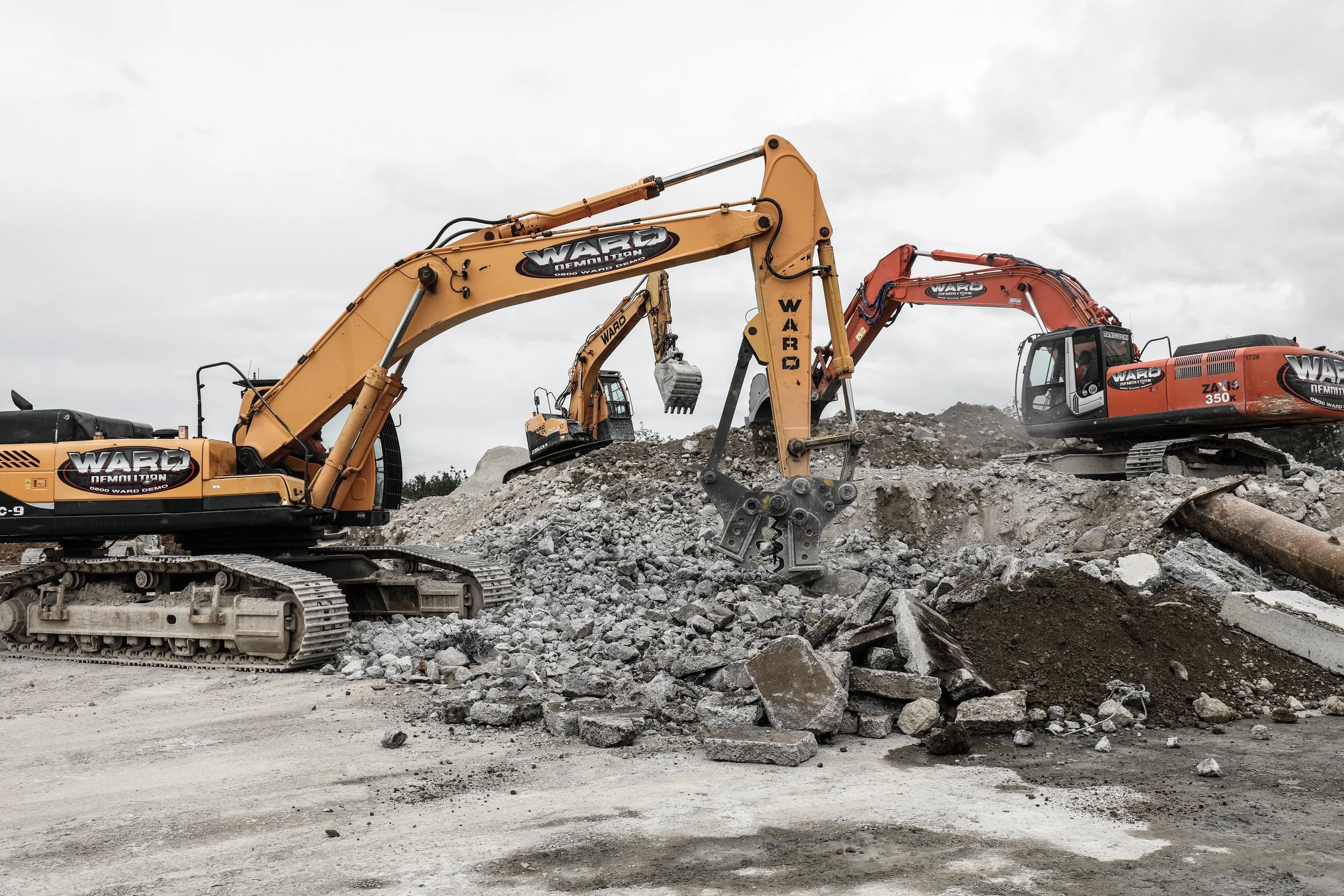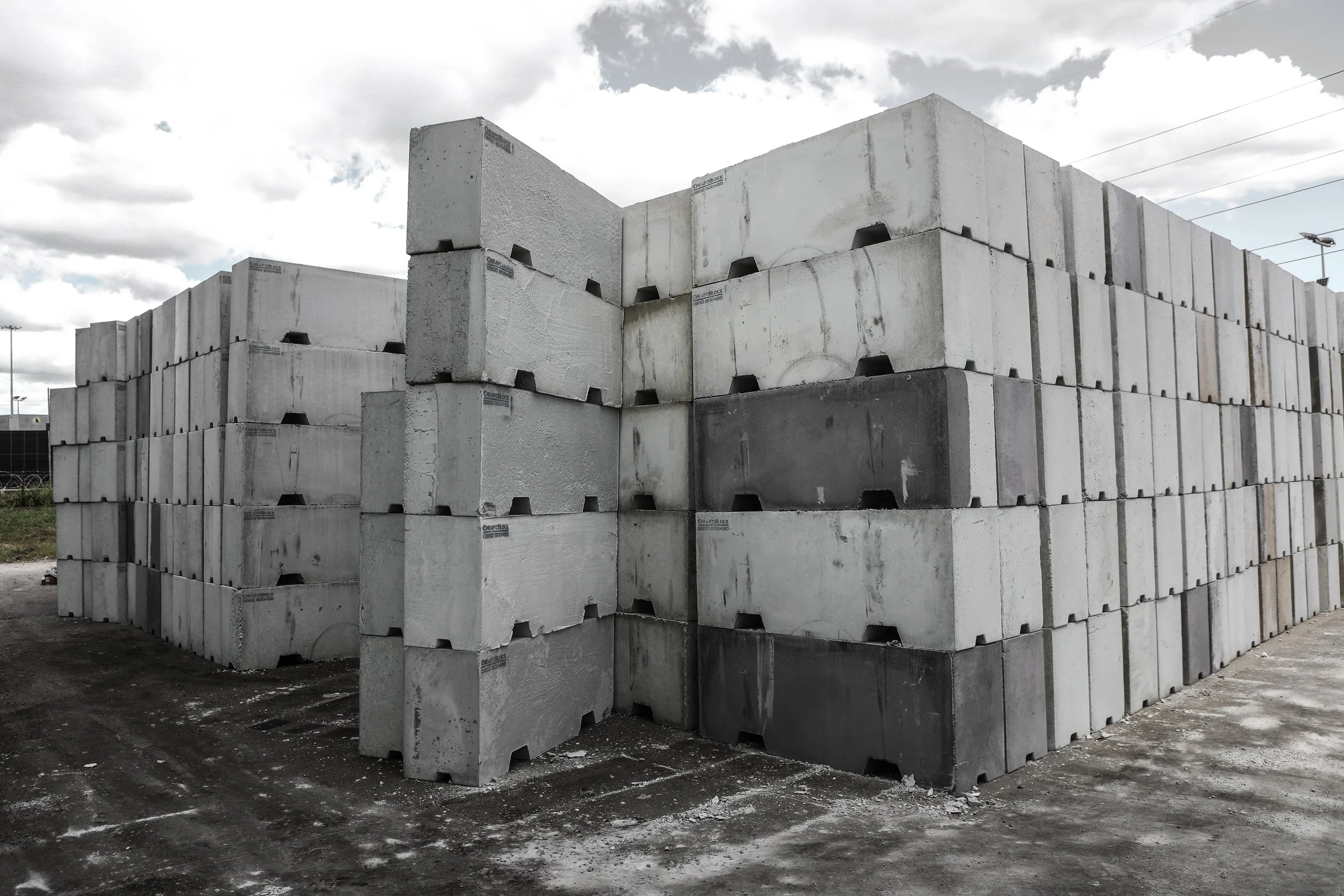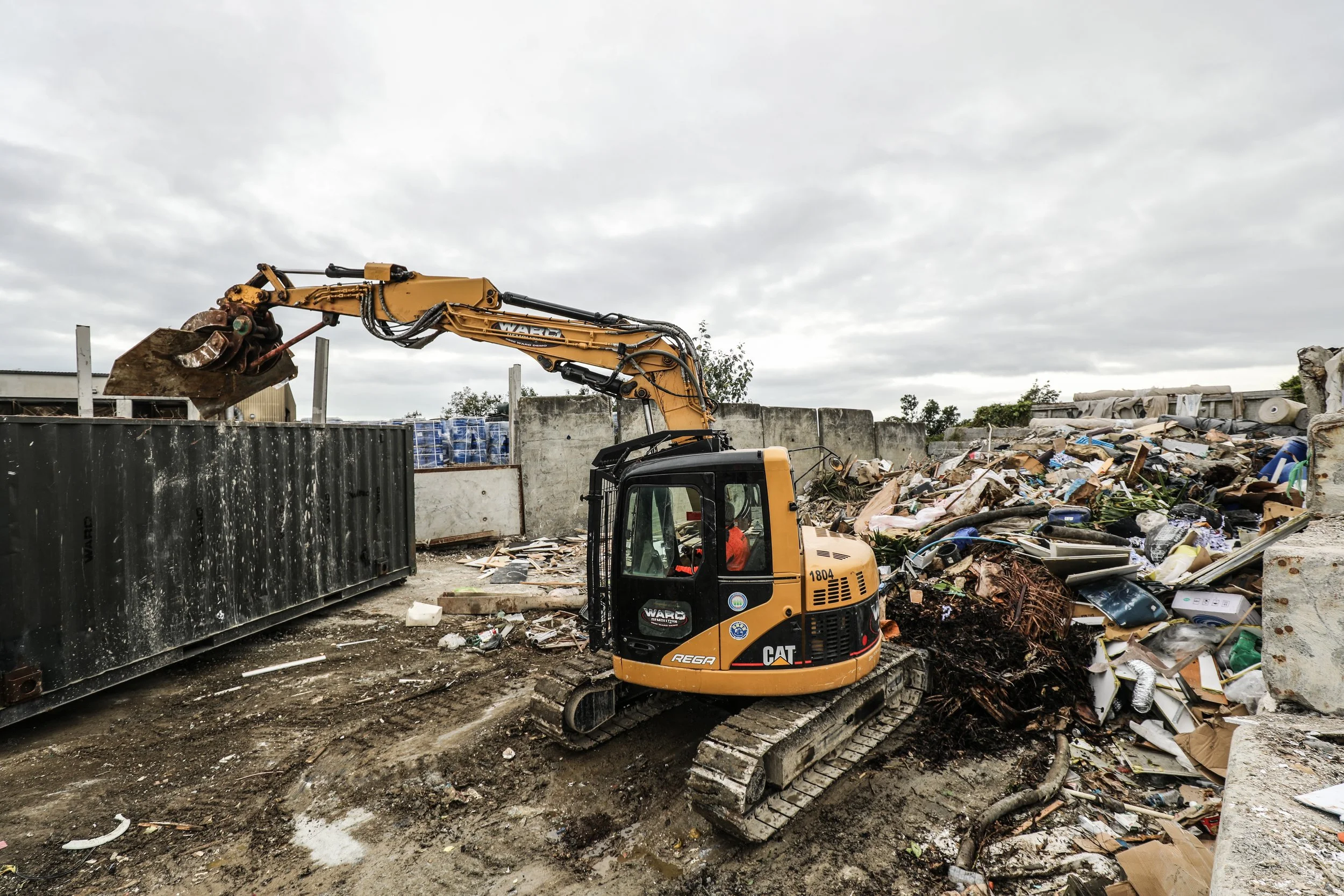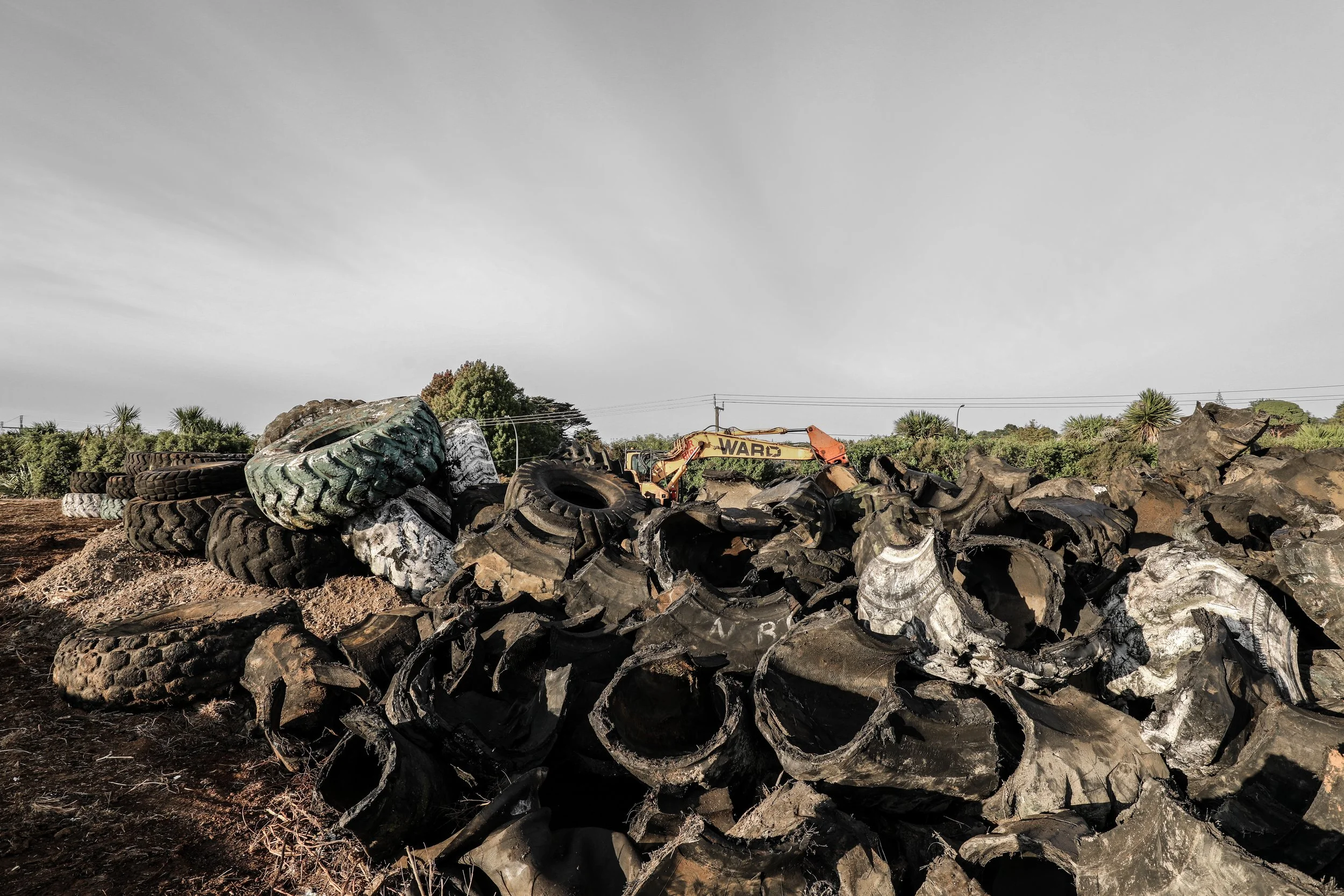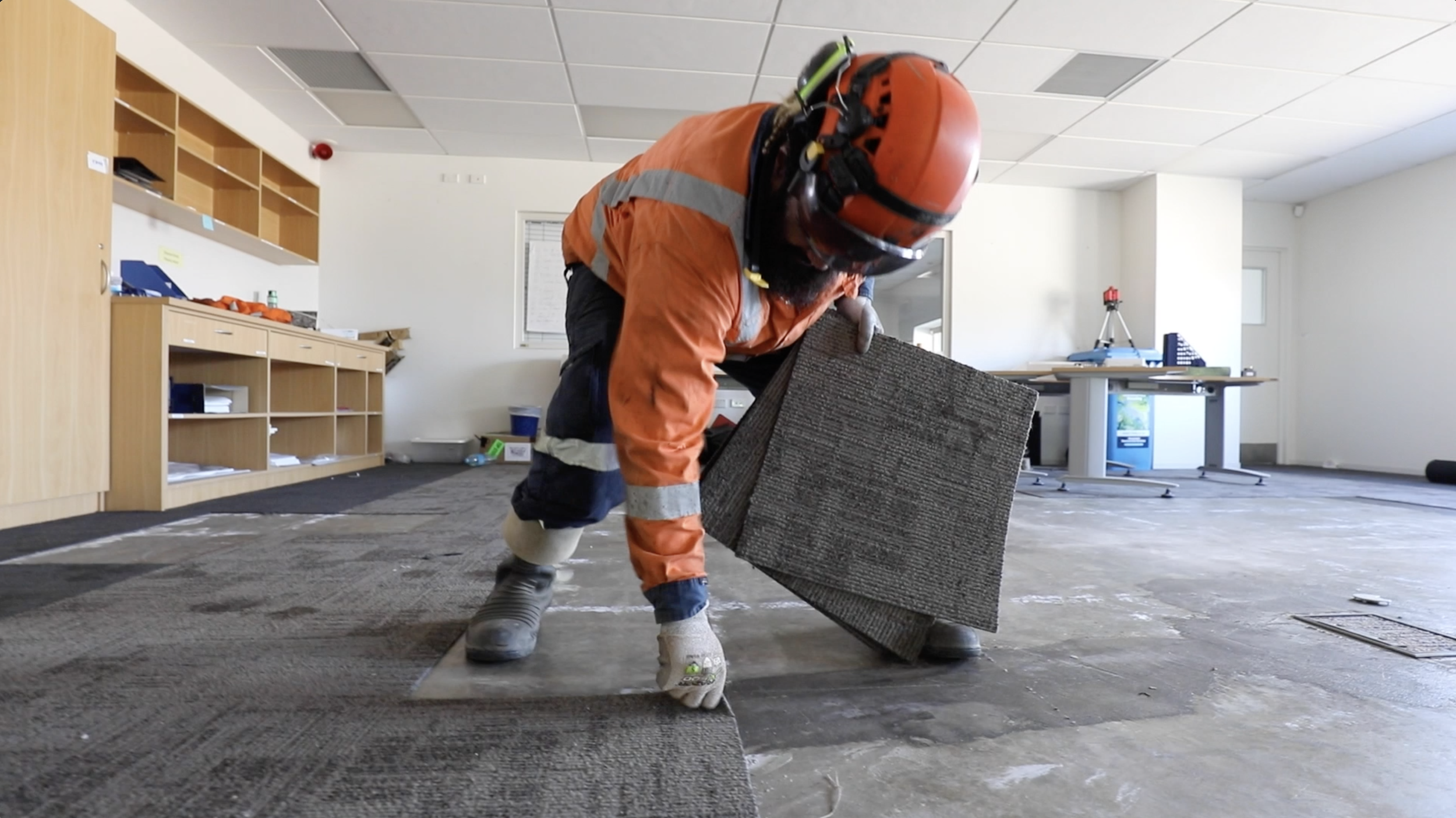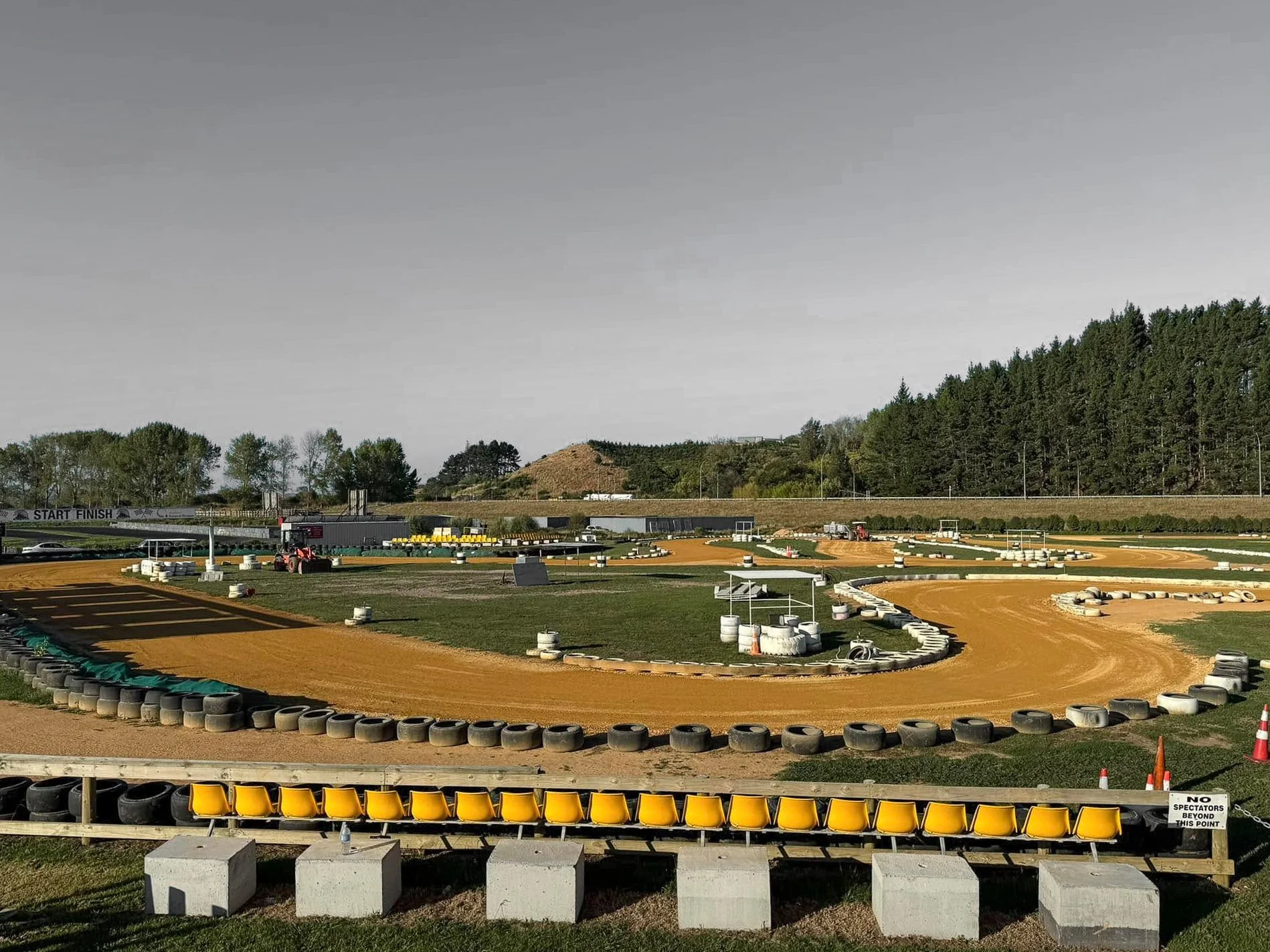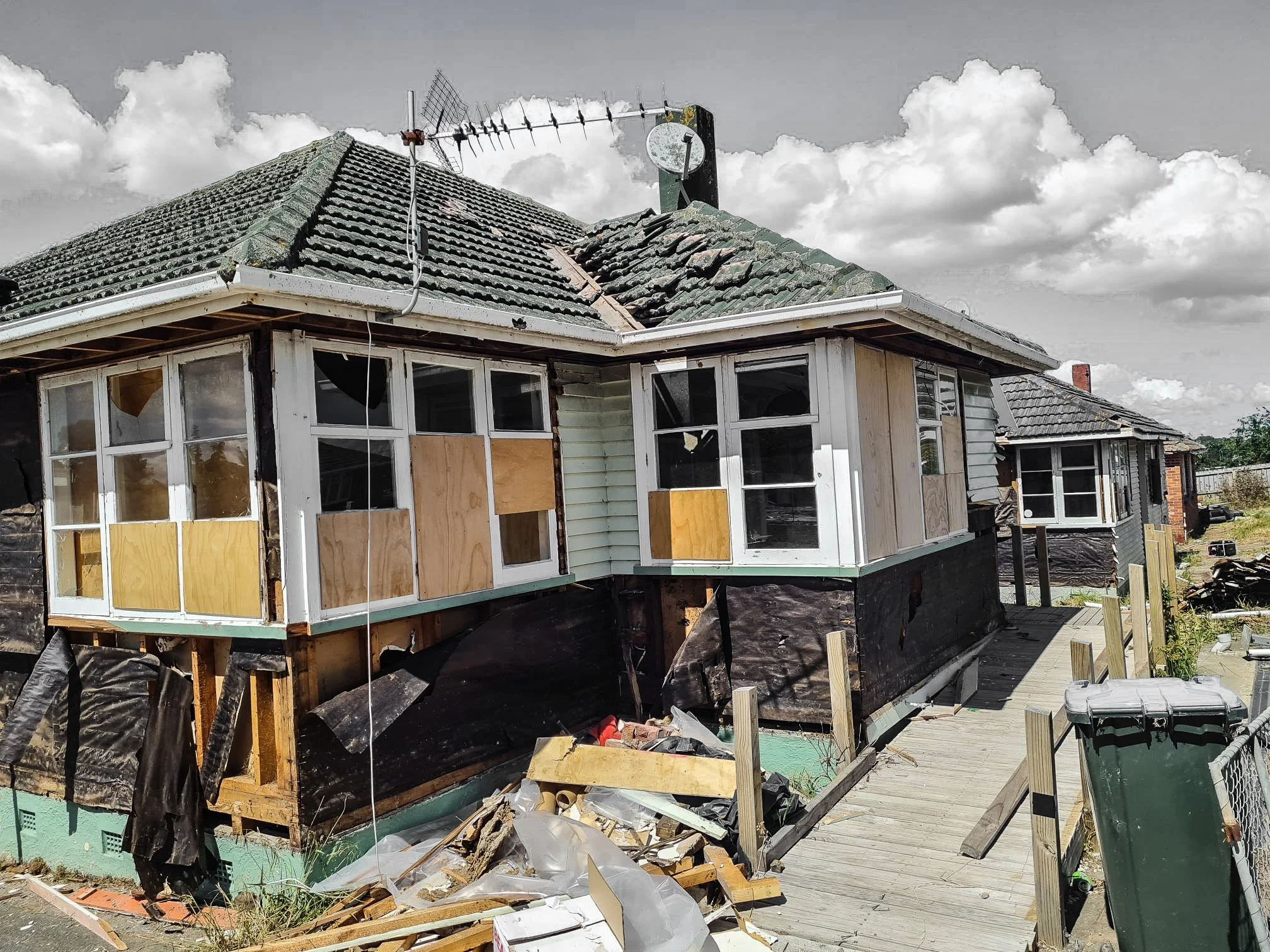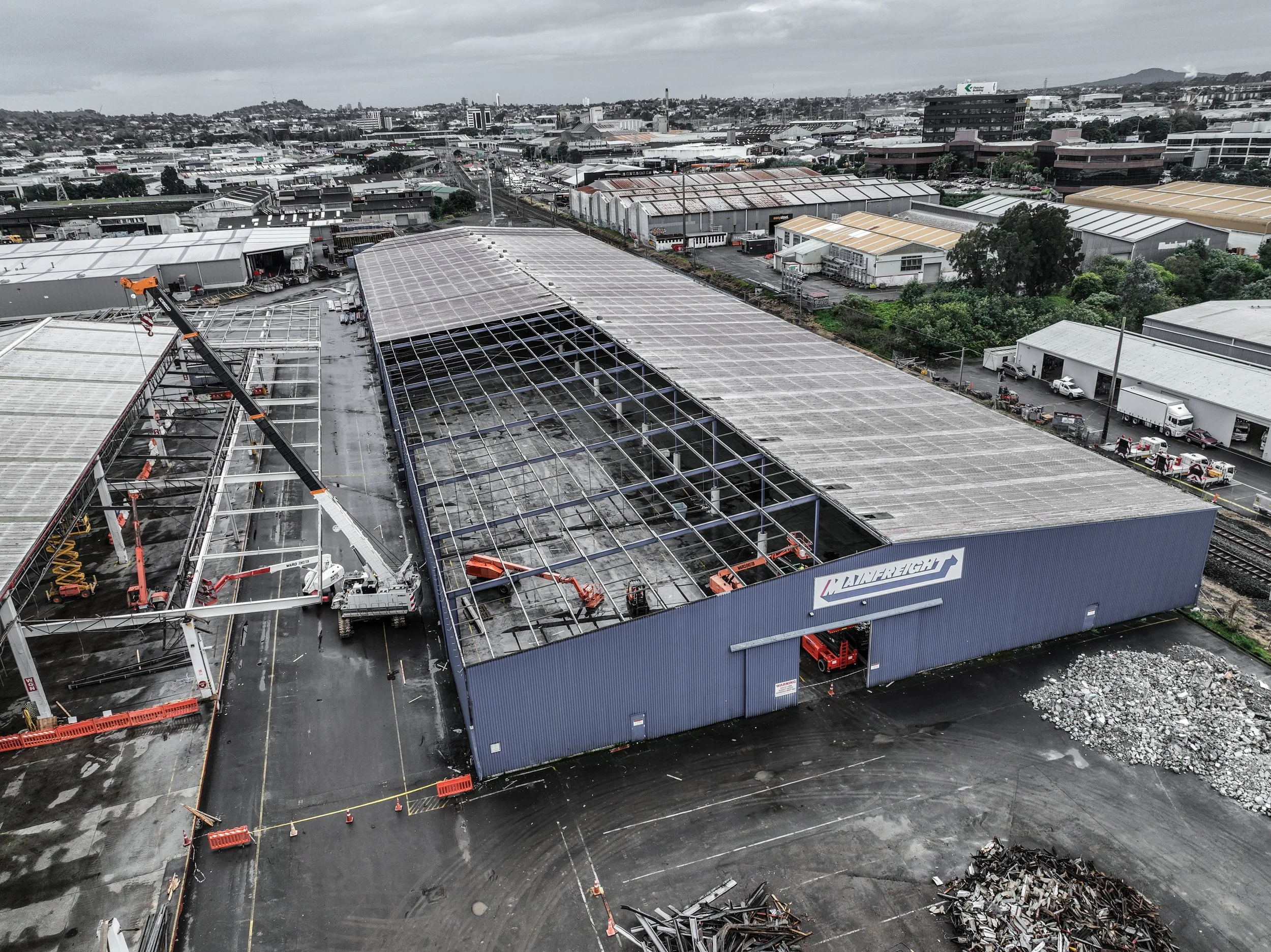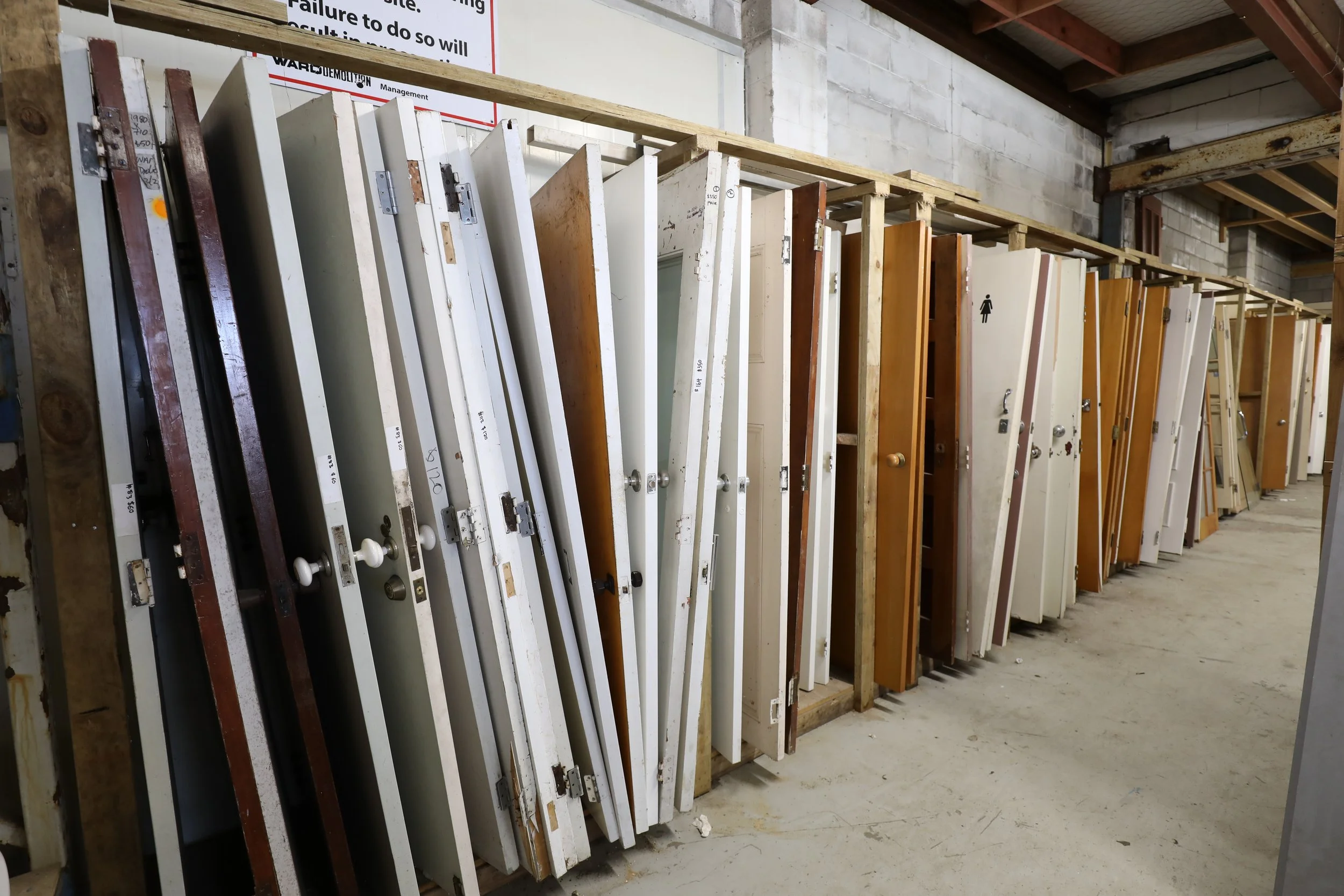Ward Recycling
Recycling has been a core value of Ward Demolition since our inception in 1987. It’s actually how Peter started the company, by obtaining used building materials and reselling them it allowed him to buy equipment to start completing his own demolition projects. Since then we have upscaled to our own concrete recycling yard with a rubbish processing facility that reduces waste to landfill. Building materials are sold or donated from site or relocated to our Salvage yard. Steel is processed onsite to optimise recycling via scrap yards. See diagram below:
Concrete Recycling
It is standard practice for us to recycle 100% of a sites concrete, the only exception being concrete that has asbestos contamination and therefore not viable for reuse. With larger jobs we often crush the concrete onsite and backfill the foundations with the material, directly recycling it and reducing carbon emissions from trucking. For smaller quantities it is brought back to our yard in Onehunga and processed with concrete received from a huge variety of demolition and Construction sites across Auckland. Ward Demolition owns the largest mobile crusher in NZ allowing us to process extensive amounts of concrete. See Concrete Recycling for more information.
We recycled around 180,000 tonnes of concrete last fiscal year.
Ward Blocks
Concrete recieved via cement trucks for disposal is redirected to our Ward Blocks yard to be poured into our moulds and turned into a reusable product. We sell these as cheap as possible to optimise recycling. We sold 7,576 recycled concrete blocks last fiscal year equating to roughly 9,000 tones of concrete reused. Being a fairly new buisness we predict we will be able to improve on this number for the current fiscal year.
Rubbish Recycling
Ward has our own rubbish processing facility in Onehunga that sorts demolition and construction waste, diverting materials to landfill by separating materials like metal and wood that can be recycled. We are rapidly growing this operation by seeking new and innovative ways to reuse materials.
Our rubbish recycling efforts are job site dependant. We adapt to each project and assess how best we can reduce waste on a case by case. A great example of this is the Pukekohe Park Raceway project where we found a place that reuses tyres as fuel, minimising the use of coal. 100% of these tyres were recycled. Which is quite extraordinary if you consider they had already been recycled from used vehicle tyres into crash barriers. Meaning they served three purposes across their decades long lifespan. More on Rubbish Recycling HERE.
Donation
Another way we like to reduce material to landfill is by giving items away which otherwise would not be worth salvaging and can not be recycled. This is also done on a case by case basis. One example is our Southdown Power Station Project, all of the office furniture was donated to local charities (eg women’s refuge). This was something we pushed for from the start of the project as there was many large desks, chairs, cabinets etc that would not sell for enough to justify transporting them to our Salvage yard. If we didn’t donate them many of the materials would have ended up in landfill. By donating them we both helped people in need and reduced waste. We also donated all the carpet tiles to our local church.
We support our staff by allowing them free salvage materials upon request for use on their own homes. This includes kitchens, windows, appliances etc. This means for reduced waste while supporting and giving back to our hard working team.
Another great example is Alexandra Parks Epsom Grandstand, the yellow plastic chairs were gifted to Franklin Dirt Kart club for spectator seating. Alongside poles and beams salvaged from other projects, to create their pit area shade. We allowed the club free hire of a 20T excavator for 6 months to build their racetrack. We are proud to support this club comprised of passionate volunteers. The Ward family are motorsport enthusiasts and dirt karting is among the cheapest form of racing, allowing those less fortunate to enjoy the typically expensive sport.
Deconstruction
Ward aim to reuse over recycle whenever possible. This can be tricky with jobs on tight deadlines or tight budgets, as it takes a lot of extra time and labour costs to gently remove things. If it is something you are passionate about for your project we would be happy to discuss cost and timeframe with you to find something that works for both of us. As part of our standard practices we salvage items easy to remove and sell. We are seeing more and more clients that are just as passionate about the environment as we are and have completed some really cool deconstruction projects. See pictured Heatherbank Street side project where we removed the native timber cladding on multiple houses set for demolition, this practice is quite common as there is a sufficient demand for reuse of native timber. Note this was one of many stockpiles and doesn’t show the entirety of the material that was salvaged as it was loaded out as the team worked.
In 2024 our team completed a mind blowing deconstruction of an entire hectare of shed. Half of which was sold immediately for reuse, the other half we will reuse ourselves in our expansion of our recycling facilities. This was a massive undertaking by our team to meticulous unscrew every sheet panel and unbolt every column/ beam. This took weeks that we fortunately had due to other operations happening simultaneously onsite.
Salvage
Our Salvage yards (Onehunga and Meremere) boast a wide range of materials removed from structures to be sold for re use. Our Onehunga yard allows customers to browse our range of joinery, sinks, appliances, doors etc. Meremere stores larger items (poles, beams, brick pallets, barriers, etc) for online sales only. This allows another avenue to facilitate the diversion of materials from landfill. Many items are sold for a fraction of the price you would buy it new. This allows for increased movement of items, enabling us to salvage more materials. See more info on Salvage HERE.




